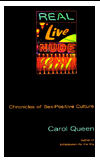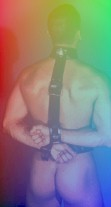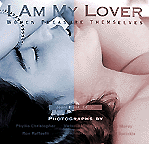 |

|
|
Chronicles of a Sex-Positive Culture By Carol Queen |
|
Review By Pamela McMullin-Messier
 In today's society sexual identities are based on the genders and sexes that we are attracted to and desire. But how does difference fit into a society/community that does not recognize deviations from the norm of sexuality, albeit heterosexual or homosexual?
Real Live Nude Girl addresses homophobia and xenophobia in various ways, pointing out how much of life (in particular, sexuality) cannot be easily defined. Our lives are often misrepresented by the labels that we wear, as well as how we wear our differences, and we need to ask ourselves the question: what is "normal" anyway? We often feel alone in our "queerness," but as we become openly sexual and sexually divergent, we can educate one another and normalize our behavior outside the mainstream.
The author, Carol Queen, says that we must do what feels right, and lead the life that brings us the most happiness. She also points out that we need to understand the obstructions (particularly the culture we live in) that stand in our way, in order to move past them.
Queen gives an autobiographical account of her sexual development and identification, first as lesbian, then as bisexual, then as "whore" and educator, in order for us to understand just where she is coming from in her sex-positive perspective.
Sex and sexuality are good places to start listening to our own voices and discovering our own truths. Queen has developed a sex positive perspective that offers: "a simple, yet radical affirmation that we each grow our own passions on a different medium, that instead of having two or three or even half a dozen sexual orientations, we should be thinking in terms of millions. In today's society sexual identities are based on the genders and sexes that we are attracted to and desire. But how does difference fit into a society/community that does not recognize deviations from the norm of sexuality, albeit heterosexual or homosexual?
Real Live Nude Girl addresses homophobia and xenophobia in various ways, pointing out how much of life (in particular, sexuality) cannot be easily defined. Our lives are often misrepresented by the labels that we wear, as well as how we wear our differences, and we need to ask ourselves the question: what is "normal" anyway? We often feel alone in our "queerness," but as we become openly sexual and sexually divergent, we can educate one another and normalize our behavior outside the mainstream.
The author, Carol Queen, says that we must do what feels right, and lead the life that brings us the most happiness. She also points out that we need to understand the obstructions (particularly the culture we live in) that stand in our way, in order to move past them.
Queen gives an autobiographical account of her sexual development and identification, first as lesbian, then as bisexual, then as "whore" and educator, in order for us to understand just where she is coming from in her sex-positive perspective.
Sex and sexuality are good places to start listening to our own voices and discovering our own truths. Queen has developed a sex positive perspective that offers: "a simple, yet radical affirmation that we each grow our own passions on a different medium, that instead of having two or three or even half a dozen sexual orientations, we should be thinking in terms of millions.
 'Sex-positive' respects each of our unique sexual profiles, even as we acknowledge that some of us have been damaged by a culture that tries to eradicate sexual difference and possibility." She shows us, through her essays, the sex-positive world that she discovered only after being ostracized by people. Once she had decided that what her culture had told her about sex was wrong, she set out to walk on the "wild side" (e.g. bisexuality, whoring, and exhibitionism) and is the better person for it.
Her book forces us to look beyond the boundaries that we have set for our "queerness" and so-called "normalcy" of our dominant culture. Her honesty is refreshing and the narratives she shares from her life are both educational and enlightening.
Real Live Nude Girl is broken down into four sections, corresponding to the name of the book. "Real" is the section that perhaps has most relevance to the GLBT literature, where she lays out her journey to sexual self-discovery, notably as bisexual, and discusses bisexuality in relation to the homosexual/heterosexual continuum.
"Dear Mom" is a letter that she has written to her now-dead mother. She had come out to her mom as a lesbian, but she never had the chance to discuss her new discoveries of sexual identity. She discusses how her mom was so oppressed by the culture, and the lesson that she learned was not to be like her mother, in succumbing to what was "normal" sexual silence for women.
In "The Queer in Me" she discusses how her sexual orientation as a bisexual is confusing, in where does she fit in to the so-called sexual continuum. She also discusses "biphobia," detailing her rebellion not just against mainstream society, but also against the lesbian and gay community's "rules" of differences.
In "Don't Fence Me In," she discusses identity politics, suggesting that bisexuals can play a role of mediation between gay and straight, not as fences but as bridges, to understanding sexuality as a rainbow instead of just two colors.
In "Moral Outrage and the New Absexuality," Queen discusses the two world views on sexuality: "I Was Born That Way" (essentialist) vs. "Right to Choose" (social constructionist). She tends to fall on the "right to choose" stance, as she is a bisexual by nature, but chose to live her life as lesbian.
She questions why causation of sexual feeling is such a big issue. She introduces absexuality as a term that means "away from" or anti-sexual to sex. This term represents those people who present themselves as anti-gay, anti-porn, anti-sex difference demagogues, the sexually moral who portray sex as threatening or fear-provoking, who actually are overly obsessed with sex.
Queen then discusses how these absexuals need to give some room for "live and let live." In "Everything That Moves," she discusses how bisexuality mirrors both the gay and straight communities, and this chapter concludes on the issues that she has touched on in previous chapters (embracing our "queerness" and "pervertedness" vs. the stigmatization of "norms" and "variants"), and brings them together nicely. 'Sex-positive' respects each of our unique sexual profiles, even as we acknowledge that some of us have been damaged by a culture that tries to eradicate sexual difference and possibility." She shows us, through her essays, the sex-positive world that she discovered only after being ostracized by people. Once she had decided that what her culture had told her about sex was wrong, she set out to walk on the "wild side" (e.g. bisexuality, whoring, and exhibitionism) and is the better person for it.
Her book forces us to look beyond the boundaries that we have set for our "queerness" and so-called "normalcy" of our dominant culture. Her honesty is refreshing and the narratives she shares from her life are both educational and enlightening.
Real Live Nude Girl is broken down into four sections, corresponding to the name of the book. "Real" is the section that perhaps has most relevance to the GLBT literature, where she lays out her journey to sexual self-discovery, notably as bisexual, and discusses bisexuality in relation to the homosexual/heterosexual continuum.
"Dear Mom" is a letter that she has written to her now-dead mother. She had come out to her mom as a lesbian, but she never had the chance to discuss her new discoveries of sexual identity. She discusses how her mom was so oppressed by the culture, and the lesson that she learned was not to be like her mother, in succumbing to what was "normal" sexual silence for women.
In "The Queer in Me" she discusses how her sexual orientation as a bisexual is confusing, in where does she fit in to the so-called sexual continuum. She also discusses "biphobia," detailing her rebellion not just against mainstream society, but also against the lesbian and gay community's "rules" of differences.
In "Don't Fence Me In," she discusses identity politics, suggesting that bisexuals can play a role of mediation between gay and straight, not as fences but as bridges, to understanding sexuality as a rainbow instead of just two colors.
In "Moral Outrage and the New Absexuality," Queen discusses the two world views on sexuality: "I Was Born That Way" (essentialist) vs. "Right to Choose" (social constructionist). She tends to fall on the "right to choose" stance, as she is a bisexual by nature, but chose to live her life as lesbian.
She questions why causation of sexual feeling is such a big issue. She introduces absexuality as a term that means "away from" or anti-sexual to sex. This term represents those people who present themselves as anti-gay, anti-porn, anti-sex difference demagogues, the sexually moral who portray sex as threatening or fear-provoking, who actually are overly obsessed with sex.
Queen then discusses how these absexuals need to give some room for "live and let live." In "Everything That Moves," she discusses how bisexuality mirrors both the gay and straight communities, and this chapter concludes on the issues that she has touched on in previous chapters (embracing our "queerness" and "pervertedness" vs. the stigmatization of "norms" and "variants"), and brings them together nicely.
The Reviewer: Pamela McMullin-Messier is a Ph.D. student in sociology at the University of Southern California. She is doing research on the social construction of population and women's rights in non-governmental organizations, on how the discourse has influenced and shaped debate on public policies. Review from the International Gay & Lesbian Review, ONE Institute Press, Los Angeles, CA |
© 1997-98 BEI
 Carol Queen's I Am My Lover
Carol Queen's I Am My Lover